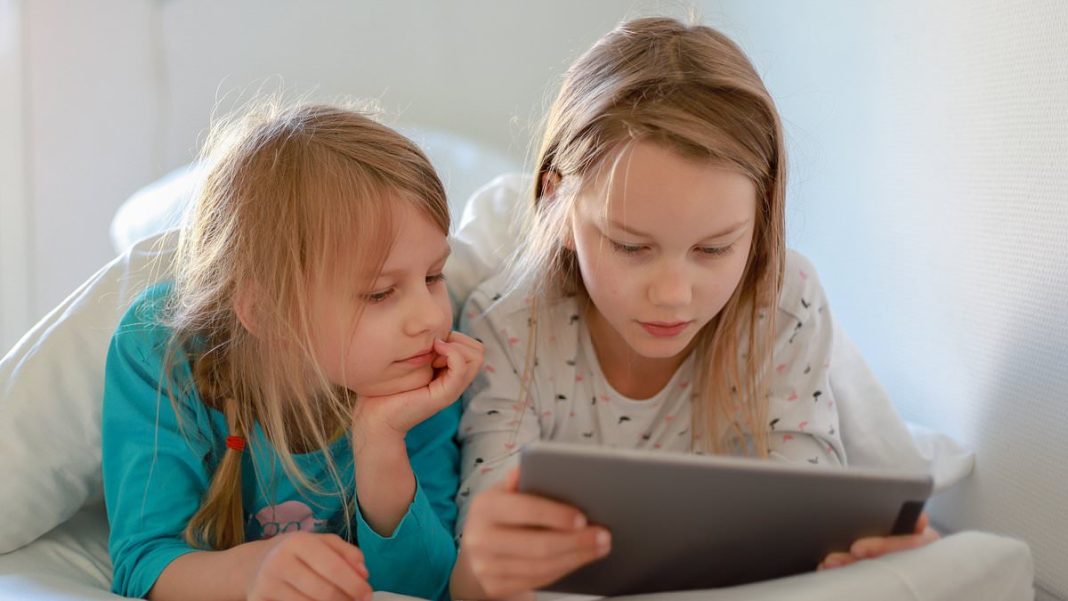Scientists pinpoint amount of kids screen time that raises autism risk,
Allowing toddlers to use tablets or watch TV for more than 14 hours per week, puts them at ‘significantly’ higher risk of autism, controversial research today suggested.
Australian researchers found two-year-olds who spend large portions of time looking at screens were more likely to show autism-like symptoms by the age of 12.
Experts have long raised the alarm over the influence of screen time on children’s development.
But the researchers, who tracked more than 5,000 kids, did acknowledge the paper was merely observational and could not prove causality.
Other scientists today also urged the public not to panic and said the study proves ‘there is no actual evidence’ linking screen time with autism.
It is not yet known exactly what causes autism, but it is sometimes passed on to children from their parents.
And studies suggest it is more common in the children of older parents, as well as mothers who are overweight or suffer pregnancy complications.
Around one in 50 youngsters fall on the spectrum.
Affected children can find it hard to make eye contact, understand how others feel, or have a keen interest in certain topics.
Autistic youngsters may also take longer to get their head around information, or repeat things.
Recent studies have spotted a link between the duration of screen time and autistic characteristics in youngsters, the team said.
In the new study, researchers quizzed the parents of 5,107 children on how long their child spent in front of a screen each week.
A follow-up questionnaire when their child was 12, then asked parents whether their child was diagnosed with autism.
They found 145 children had received a diagnosis.
Writing in the journal, JAMA Pediatrics, researchers said autism risk was ‘significantly greater in children with more than 14 hours of weekly screen time compared with children with less than 14 hours of weekly screen time by two years’.
They also advised clinicians to inquire about screen time during early childhood as part of a broader assessment of child development.
They added: ‘Screen time can be a useful marker for identifying families needing additional support.’
But scientists, who were not involved in the research, questioned the validity of the results.
Dr James Findon, a senior lecturer in psychology at King’s College London said: ‘While this study found an association between screen time before 2 years of age and being diagnosed with autism before 12, it does not suggest a causality.
‘This is consistent with our understanding of the development of autism which is predominantly genetic.
‘What the results show us is that autistic children are more likely to have higher screen time than their neurotypical peers.
‘Screen time often gets bad press, but for many autistic children screen time can be beneficial.
‘This might be because screen time helps them regulate their emotions and calms them during periods of sensory overload.’
Dr Rachel Moseley, an expert in psychology at Bournemouth University, also said: ‘The findings of this study cannot tell us anything about the direction of the relationship between being autistic and time spent on screens.
‘It is more likely that children who are already autistic but not yet diagnosed, and their parents, might be finding particular benefits of screen-time.
‘Note that autism is quite rarely diagnosed before 2 years of age, but autistic children are still autistic and developing differently before that point.’
It comes as the Children’s Commisioner last month warned that kids forced to wait years for autism diagnoses on the NHS are being ‘robbed’ of their childhoods.
Data, accessed by the independent watchdog, shows one in six children seeking an autism diagnosis waited more than four years via the NHS’s community services, as of March 2024.
Autism is not a disease and people have it from the moment they are born, although it may not be spotted until childhood and sometimes much later.
Autism exists on a spectrum. Some people will be able to lead fully functioning lives with no additional help. Others may need full-time assistance.
In September, Sweden’s Public Health Agency advised parents not to allow kids under two to use smartphones and tablets or watch televisions.
Children between the ages of two and five should also be limited to a maximum of one hour of screen time a day, it said in new recommendations.
It follows a similar move by Danish officials who issued their own age-related rules in 2023 only allowing youngsters under two in ‘very special cases’ such as those with learning difficulties, to use the devices.
Children’s screen time rocketed during the Covid pandemic, when lockdowns and school closures forced them to stay indoors.
In the UK, neither the NHS nor the National Institute of Clinical Excellence (NICE) have any detailed guidance for screen time among babies and toddlers.
But they do recommend an upper limit of two hours per day for all children.
The UK’s Chief Medical Officer also suggests a ‘precautionary approach’ to using screen devices.








